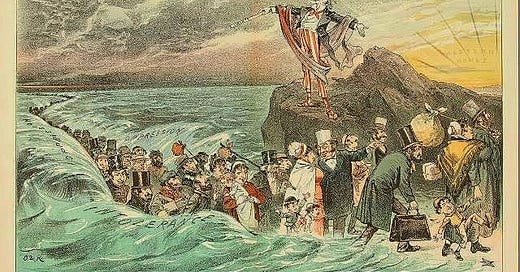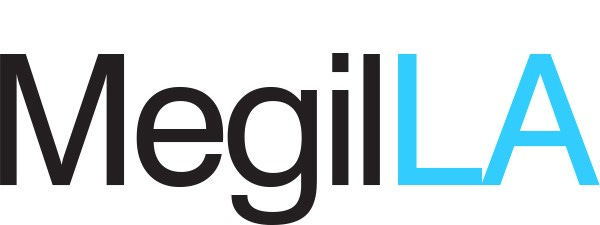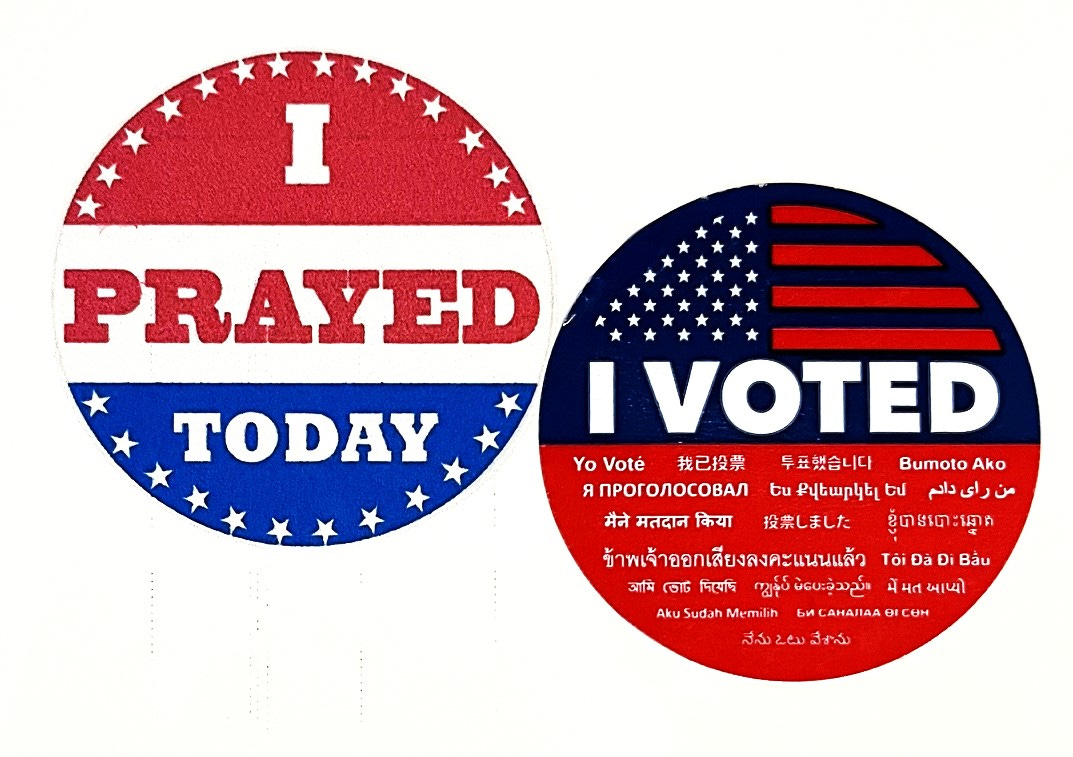Voting is a Kind of Prayer
A New Scroll of LA Jewish News
"Modern Moses" from Puck magazine c.1885. U.S. Holocaust Memorial Museum
Folks,
Coming to America, a voyage into freedom made by many of our parents, grandparents, and great-grandparents, meant that as soon as they became citizens, they could vote. For the first time, they could choose their leader, and even become one. As we vote today, and watch the returns, we remember that here in California in 1883, a Jewish candidate, Washington Bartlett, was elected mayor of San Francisco, and in 1887 became the state’s first, and until today, only Jewish governor. Today, Congressman Adam Schiff, who, the polls say will be elected to the U.S. Senate, will continue the tradition of Jews in California serving in public office. Though not up for election, another Jewish Angeleno, Doug Emhoff, may become the nation’s first, first gentleman. May both he and Schiff help to banish hatred and bigotry, and bring peace, happiness and prosperity to our country.
On a more personal level, in our family, the Jewish descendants of those who came to America, are also engaged in today’s election. Though some Jewish households may favor Trump (polls show around 30% do), ours is full-on for Kamala, with a couple in our extended family even knocking on doors and making phone calls for her in swing states. The canvassers report that the swing state get out the vote drives are well-organized, and that folks who answer the calls, or open their doors, are receptive to the candidate’s message.
As for me…here is my last minute pitch for your support: On election day, I hope you are ready to cast your vote for MegilLA. Has it been more than a year since you last re-subscribed? With each issue, I work to bring you a fresh perspective on the Jewish life around us. I need your vote. Please SUBSCRIBE today.
Edmon J. Rodman
////\/\\\\
////\/\\\\
Voting is a kind of prayer
Edmon J. Rodman
More than any election in memory, this one seems a good time for prayer. In 1972, the year I first voted for president, I fervently wanted Nixon to lose. In 2008, I hoped Barack Obama would win, and in 2016, I feared Trump would ruin us all. In all the elections in which I voted, I never thought to pray, until this year.
On most election days, I want to finish voting as quickly as possible, and get on with my day. But sitting at my kitchen table, filling in a mail-in ballot, gave me time to write-in my hopes.
Though you usually are choosing simply between the catastrophizing of Republicans and the dogma of Democrats, between how much money will be spent and on whom and what, this year’s choice represented a choice between matters less material, and ideologies less red and less bluish.
As I religiously filled in the ballot’s bubbles, with the candidates passing before me, name by name, it seemed like Yom Kippur, a kind of political Day of Judgment. Who would be sent to Washington, and who sent back to their home in Ek Velt. Who would lose their seat by what they had said, and who by their actions.
Pausing at each office on the ballot and then reading the accompanying text seemed much like the cadence of prayer. When I signed and sealed the ballot, following the directions to the last detail, it only added to the impression of completing a ritual.
Though I felt good about completing the task, and rewarded myself by eating a Levain cookie, something was missing.
When I do something with so much intentionality, with so much kavanah, there usually is a prayer. When I break bread, begin a new phase, pass successfully through a situation of danger, remember the dead, or see something beautiful, in the Jewish tradition, there always is a prayer.
When I decide who I want to lead my country, to help keep my family and friends in health, prosperity, and the pursuit of happiness, there should be a prayer too, with feelings of hope and belief. As I soon discovered several have been written.
In 2016, before the Trump-Clinton election, Rabbi David Seidenberg, wrote a simple blessing:
“Blessed are you, Adonai our God, Sovereign of the Universe, who expects us to engage as citizens in our country.” Direct, non-partisan, and non-judgmental, the prayer places the expectation of voting directly on the voter. No guidance is offered as to how to vote, however.
“From where would my help come?”
A voting prayer written by Kate Hennessey in 2022, draws upon the admonitions of the Torah as guidance for our vote. “Standing at the polling booth, I represent those who came before me and cleared the way so that I could easily step forward and cast my ballot,” she wrote.
“I will carry on the legacy of my Jewish matriarchs like Ruth Bader Ginsburg Who carried a mantle bearing the declaration “Tzedek Tzedek tirdof — justice, justice, you shall pursue.”
“Had I pursued justice with my vote?” I wondered.
Before the Biden-Trump election of 2020, Rabbi Sam Feinsmith added to the election liturgy with a prayer that updated the centuries-old Jewish Prayer for Our Country:
“May those elected to office recognize that they have come to power not to subjugate, dominate, or oppress those with whom they disagree, but to hallow and serve Your great name.”
“May it be God’s will,” I thought.
Reaching to the Heavens, Rabbi Seidenberg in 2020, added a new electoral prayer: “May You give a listening heart to whomever we elect,” he wrote.
“And may it be good in Your eyes
to raise for us a good government
to bring healing, justice and peace
to all living in this land
and to all the world, and upon Jerusalem.”
“Amen to that,” I thought.
The next day, the prayers, adhering to my mind like an election day sticker, inspired a prayer of my own. Before driving to the corner ballot box drop-off, I wrote it down:
Bless the names of my grandparents,
Who, like many today, came to this great country,
To escape tyranny,
And to work towards a better a life for their families.
In their memory, let this be an election of peace.
With Your light,
Guide the winners, and the losers,
In the ways of justice,
As well as what it takes to keep a good name.
And please, let us know the results soon.
////\/\\\\
A campaign to end election anxiety
Biting your nails over the election? Thumbs tired from doomscrolling the latest polls? Then, it will come as no surprise that in a recent poll from the American Psychiatric Association, more than 70 percent of Americans reported the upcoming election is causing them anxiety.
According to The Blue Dove, an organization created "to address mental illness and addiction in the Jewish community and beyond," we should be aware that “Election anxiety can potentially harm relationships, foster confusion about what is taking place and generate distrust in the government and the electoral process itself.”
To address that anxiety The Blue Dove offers some constructive ideas that can be applied to our daily lives. Suggestions include the setting of boundaries, like asking someone who is agitated not to speak about a particular topic, such as politics, in a specific setting.
They also suggest finding news sources that inform without agitation.
For support, they recommend identifying an “emotions chavruta” (Hebrew for partner) with whom you can share what you are experiencing.
////\/\\\\
*Live from the Archive
LA's first kosher candidate
Edmon J. Rodman
When a Jew wins an election for public office, how will their Jewish identity influence their term in office? Will they be fearful of stressing their identity? Or let it influence their agenda?
The campaign button shown above (metal, 1.5 inches in diameter), was from Harry Lyon’s first try at public office in 1909. Though he gained the support of many in the Jewish community, he lost.
In 1917 he tried again for higher office. Running as a Republican, he became the first Jewish assembly member representing Los Angeles.
After winning re-election several times to the 64th district, in 1927 he introduced a bill, sponsored by Union of Orthodox Rabbis, concerning the representation and labeling of kosher food. Restaurants were selling both kosher and non-kosher foods and not properly labeling them.
The measure stated that “anyone who sells or exposes for sale both kosher and non-kosher food for consumption on the premises, not prepared in accordance with Jewish ritual, or not sanctioned by the Hebrew orthodox religious requirements and who failed to display signs ‘kosher and non-kosher food served here,’ would be guilty of a misdemeanor.”
The bill passed both houses but was vetoed by Governor C.C. Young, who said it would create an “unwise precedent.”
After re-introducing the bill several times, in 1931, with a new governor, James Rolph, Lyons finally succeeded.
“The Jewish people,” said Rolph, “have a much right to their religion as anyone else. No one has to buy kosher meat. However, I want it assured that any kosher meat offered for sale has been prepared in accordance with Jewish traditions.”
*The Rodman Archive of Los Angeles Jewish History is a collection of approximately 1000 objects, photos, clothing, art, books, recordings, and ephemera relating to the lives and endeavors of Jewish Angelenos between 1850 and 1980.
////\/\\\\
Seen on the way: Fairfax area
The best platform of all.
////\/\\\\








